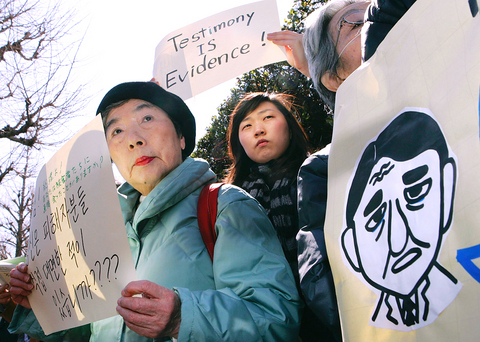Japanese Prime Minister Shinzo Abe's government said yesterday it did not believe there was proof Japan forced women into World War II brothels, reiterating remarks that caused an uproar earlier this month.
"The government did not find evidence showing forced recruitment by Japanese military authorities or bureaucrats," Abe's Cabinet said in a policy statement in parliament responding to a question by an opposition lawmaker.
It said, however, that the Cabinet would not change a landmark 1993 apology that the Japanese government issued to former sex slaves.

PHOTO: REUTERS
The 1993 apology "was not endorsed by the then Cabinet of Prime Minister Kiichi Miyazawa but successive Japanese Cabinets have inherited it," the statement said.
Abe, known for his conservative views on history, caused outrage earlier this month when he said there was no evidence that so-called "comfort women" were forced into sexual slavery "in the strict sense of coercion."
He later elaborated, saying he was talking about physical coercion, such as kidnappings of women by Japanese soldiers to put them into brothels.
After an uproar, Abe has said repeatedly that he stands "sincerely" by the 1993 apology.
Abe's remarks have provoked a furor in Asian countries that were invaded by Japan and in the US, where the US Congress is considering a bill that would demand Japan make an outright apology to comfort women.
South Korean lawmaker Yoo Ki-hong yesterday visited Tokyo to demand a "forward-looking settlement" to the comfort women row.
"The grudge and hatred of about 200,000 comfort women mobilized from Korea, China, the Philippines, Australia, etcetera, are being revived now," Yoo said in a statement he handed to Japanese government officials.
"We strongly ask the prime minister to pay attention to and sincerely listen to the voice of the world," said the statement by Yoo, a member of South Korea's ruling Uri party.
"Abe, as the prime minister of Japan, should come face to face with the victims of sex slavery and see the historical truth," the statement said.
Historians say up to 200,000 young women, mostly from Korea but also from Taiwan, Indonesia, the Philippines and China, were forced to serve as sex slaves in Japanese army brothels.
The 1993 statement, issued by the top government spokesman at the time, apologized to comfort women and said the Imperial Army was involved "directly or indirectly" in their recruitment and in the management of the brothels.
In Taipei, the Ministry of Foreign Affairs yesterday rebutted the Japanese government's claims that "no hard evidence" exists proving that the Japanese military forced scores of women into prostitution during World War II.
"Japan should face its history more squarely," said ministry spokesman David Wang (
"To dismiss the phenomenon because of a lack of evidence in a few, single cases is to ignore a historical happening that was broad and pervasive," Wang said.
The Japanese government should also offer material retribution, or closure, to those who suffered under Japan's practice of sex slavery in World War II, or their families.
"They deserve justice," he said, referring to the victims and their families.
Additional reporting by Max Hirsch

‘ABUSE OF POWER’: Lee Chun-yi allegedly used a Control Yuan vehicle to transport his dog to a pet grooming salon and take his wife to restaurants, media reports said Control Yuan Secretary-General Lee Chun-yi (李俊俋) resigned on Sunday night, admitting that he had misused a government vehicle, as reported by the media. Control Yuan Vice President Lee Hung-chun (李鴻鈞) yesterday apologized to the public over the issue. The watchdog body would follow up on similar accusations made by the Chinese Nationalist Party (KMT) and would investigate the alleged misuse of government vehicles by three other Control Yuan members: Su Li-chiung (蘇麗瓊), Lin Yu-jung (林郁容) and Wang Jung-chang (王榮璋), Lee Hung-chun said. Lee Chun-yi in a statement apologized for using a Control Yuan vehicle to transport his dog to a

Taiwan yesterday denied Chinese allegations that its military was behind a cyberattack on a technology company in Guangzhou, after city authorities issued warrants for 20 suspects. The Guangzhou Municipal Public Security Bureau earlier yesterday issued warrants for 20 people it identified as members of the Information, Communications and Electronic Force Command (ICEFCOM). The bureau alleged they were behind a May 20 cyberattack targeting the backend system of a self-service facility at the company. “ICEFCOM, under Taiwan’s ruling Democratic Progressive Party, directed the illegal attack,” the warrant says. The bureau placed a bounty of 10,000 yuan (US$1,392) on each of the 20 people named in

The High Court yesterday found a New Taipei City woman guilty of charges related to helping Beijing secure surrender agreements from military service members. Lee Huei-hsin (李慧馨) was sentenced to six years and eight months in prison for breaching the National Security Act (國家安全法), making illegal compacts with government employees and bribery, the court said. The verdict is final. Lee, the manager of a temple in the city’s Lujhou District (蘆洲), was accused of arranging for eight service members to make surrender pledges to the Chinese People’s Liberation Army in exchange for money, the court said. The pledges, which required them to provide identification

INDO-PACIFIC REGION: Royal Navy ships exercise the right of freedom of navigation, including in the Taiwan Strait and South China Sea, the UK’s Tony Radakin told a summit Freedom of navigation in the Indo-Pacific region is as important as it is in the English Channel, British Chief of the Defence Staff Admiral Tony Radakin said at a summit in Singapore on Saturday. The remark came as the British Royal Navy’s flagship aircraft carrier, the HMS Prince of Wales, is on an eight-month deployment to the Indo-Pacific region as head of an international carrier strike group. “Upholding the UN Convention on the Law of the Sea, and with it, the principles of the freedom of navigation, in this part of the world matters to us just as it matters in the